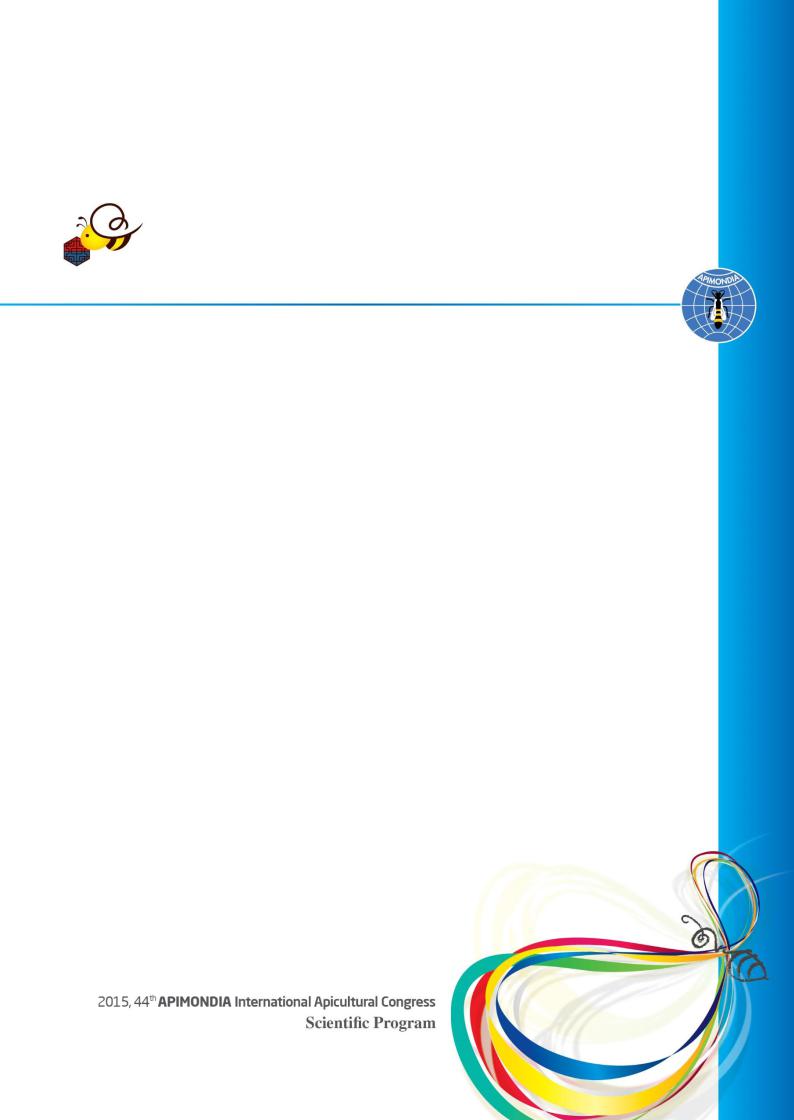
Apimondia 2015 Abstract book (South Korea)
.pdf
Beekeeping for Rural Development Room 105, 13:00 – 14:15, Thursday, 17 September
Symposium: Indigenous Bees and Conservation II
Chair-Person: Dr. Nicola BRADBEAR and Prof. Dr. Seunghwan LEE
13:00-13:15 |
Korea |
Beekeeping industry in Cambodia and Laos (Habitat losses of |
|
|
wild bees) |
|
|
Jinyeong Choi, Seunghwan Lee |
13:15-13:30 |
India |
Forest beekeeping system of Apis cerana colonies by Todas: A |
|
|
community based conservation approach. |
|
|
Robert Leo |
13:30-13:45 |
Mexico |
Community organizing strategies for the conservation of |
|
|
Scaptotrigona mexicana: a perspective from the Totonac |
|
|
culture for the appropriation of nature |
|
|
Atzin Garcia Flores, Maria Reyna Hernández Colorado, |
|
|
Crescencio García Ramos |
13:45-14:00 |
Uganda |
Evaluation of performance of different beehives types used in |
|
|
Uganda |
|
|
Robert Kajobe |
14:00-14:15 |
Uganda |
Honeybee forage plants, bee visitation counts and properties of |
|
|
honey from different agro-ecological zones of Uganda |
|
|
Alice Kangave |
Guide time: it could be often changed by chairman under condition of symposium
90

Beekeeping for Rural Development Room 105, 15:00 – 16:30, Thursday, 17 September
Symposium: Apiculture with Indigenous Bees
Chair-Person: Prof. Dr. Ki-jeong HONG and Prof. Dr. Seunghwan LEE
15:00-15:15 |
India |
An Integrated technique of sustainable honey harvesting from |
|
|
the nests of Apis dorsata in plains of Karnataka, India |
|
|
Narayanappa Nagaraja |
15:15-15:30 |
Cameroon |
Oku white honey production from Kilum-Ijim Forest- |
|
|
Cameroon |
|
|
Wirsiy Emmanuel Binyuy |
15:30-15:45 |
Czech |
Beekeeping in the Czech Republic and Czech association of |
|
Republic |
beekeepers |
|
|
Jaroslav Hrabak |
15:45-16:00 |
Indonesia |
The potential for wild bee honey production |
|
|
Mochammad Junus |
16:00-16:15 |
Malaysia |
Sizes of artificial hive and the performance of the stingless bee |
|
|
Heterotrigona itama in Agropolis unisza apiary. |
|
|
Abd Jamil Zakaria, Muhammad Muslim Mohd Rodi |
16:15-16:30 |
Benin |
Perceptions and adaptations of beekeepers and honey hunters |
|
|
to climate change in the Communes Djidja, Dassa and |
Tchaourou located South, center and Northern part of Benin
Gregoire Paraiso, Roméo Ayeleroun,
Franck Akogbeto, Bienvenu Adjoha, Armand Paraiso
Guide time: it could be often changed by chairman under condition of symposium
91

Beekeeping for Rural Development Room 105, 17:00 – 18:30, Thursday, 17 September
Symposium: Apiecotourism and Urban Beekeeping
Chair-Person: Dr Nicola BRADBEAR and Prof. Dr. Seunghwan LEE
17:00-17:15 |
Korea |
Ecological Alternative: Effects of Rooftop Garden on Foraging |
|
|
of Honey Bee in Urban Landscape |
|
|
Yoori Cho, Minjoo Lee, Jongho Kim, Sungsoo Yoon, Dowon Lee |
17:15-17:30 |
Australia |
The Canberra urban honey project: Lessons for the role of |
|
|
apiculture in sustainable urban food systems. |
|
|
Mitchell Pearce, Carmen Pearce-Brown |
17:30-17:45 |
Korea |
A Study on developing a non-nomadic bee-keeping model |
|
|
forest to promote apiculture, agroforestry and api-ecotourism |
|
|
in Korea |
|
|
Ara Seol, Joosang Chung, Shinyoung Park, Wookju Jeong, |
|
|
Youngji Kim |
17:45-18:00 |
Brazil |
Entrepreneurial development in Brazil by beekeeping |
|
|
Demian Condé |
18:00-18:15 |
France |
Crowdsourcing for starting beekeeping businesses |
|
|
Milan Wiercx van Rhijn |
18:15-18:30 |
Turkey |
Creation awareness in students of primary schools about |
|
|
importance of honey bee for society and environment |
|
|
Meral Kekeçoğlu, P Goç Rasgele, F Şahin, M Kambur |
Guide time: it could be often changed by chairman under condition of symposium
92

Beekeeping for Rural Development Room 105, 17:00 – 18:30, Friday, 18 September
Symposium: Beekeeping Sector Reviews
Chair-Person: Prof. Dr. Khem Raj NEUPANE and Prof. Dr. Jong Kyun PARK
17:00-17:15 |
Saudi Arabia |
Beekeeping in Saudi Arabia : past, present, opportunities and |
|
|
challenges |
|
|
Ahmad Alkhazim Alghamdi |
17:15-17:30 |
Myanmar |
The Beekeeping in the Republic of the Union of Myanmar |
|
|
Hlaing Minoo, Siriwat Wongsiri |
17:30-17:45 |
Thailand |
Apiculture and Pollinator Industry Survey in Thailand |
|
|
Chama Phankaew |
17:45-18:00 |
Japan |
Reconstruction of the farmland suffered by Tsunami damage |
|
|
struk by the Great East Japan Earthquake and revitalization |
|
|
of apicultural industry |
|
|
Kikuji Yamaguchi, Makoto Watanabe, Yoshihisa Yamaguchi |
18:00-18:15 |
Korea |
Beekeeping of Apis cerana in Korean peninsula: history, |
|
|
present, and future |
|
|
Seunghwan Lee, Minsuk Oh |
18:15-18:30 |
Nigeria |
Can beekeeping be sustained in Nigeria? |
|
|
Oluwasanjo Okunlola, Yusuf Adeyemo |
Guide time: it could be often changed by chairman under condition of symposium
93

Beekeeping for Rural Development Room 105, 09:00 – 10:30, Saturday, 19 September
Symposium: Regional Beekeeping I
Chair-Person: Mr. Nicholas BISHOP and Prof. Dr. Seunghwan LEE
09:00-09:15 |
Nigeria |
Factors influencing subsistent farmers’ decision to practice |
|
|
beekeeping in two ogbomoso local government areas, south |
|
|
western Nigeria |
|
|
Samuel Adelani Babarinde, Timothy A. Adebayo, |
|
|
Adebusola A Adepoju, Adetayo D. Adeleye, Odunyemi Ayobami, |
|
|
Ibukun B. Babatunde, Solomon Yisa |
09:15-09:30 |
Turkey |
Occupational health and safety in beekeeping – steps in risk |
|
|
assessment |
|
|
Cengiz Erkan, Ayhan Gosterit |
09:30-09:45 |
Ghana |
Top bar honey comb hangers (HCH) for fixing and |
|
|
transporting honey combs on top bars |
|
|
Abraham addo, Ansah Allotey |
09:45-10:00 |
Nigeria |
Management practices to avoid stings of honeybees during |
|
|
field work |
|
|
Akpoke Chiegele Christian, Akunne Chidiebere Emmanuel |
10:00-10:15 |
Indonesia |
Potential of sunflower and mustard greens brassica juncea l |
|
|
for bees food related to the development of bee tourism in the |
|
|
village Watu Agung Pasuruan, Indonesia |
|
|
James Hutagalung, Suhartatik, Wiwin Retnowati, Hardiyanto, |
|
|
Ahmad Radjaram |
10:15-10:30 |
Tunisia |
The tunisian experience in organic beekeeping |
|
|
Abbes Saidi |
Guide time: it could be often changed by chairman under condition of symposium
94

Beekeeping for Rural Development Room 105, 10:50 – 12:35, Saturday, 19 September
Symposium: Regional Beekeeping II
Chair-Person: Dr. Ram Keshari DUWAL and Prof. Dr. Seunghwan LEE
10:50-11:05 |
Ethiopia |
Constraints and opportunities of beekeeping in Werieleke |
|
|
District of Tigray region, Ethiopia |
|
|
Teweldemedhn Gebretinsae Hailu |
11:05-11:20 |
United Arab |
The path to sustainable beekeeping in the United Arab |
|
Emirates |
Emirates |
|
|
Denis Anderson, Ihsan Joma, Mohammed Hammadi |
11:20-11:35 |
Malaysia |
The potential of high income beekeeping projects in acacia |
|
|
forest reserves in Malaysia |
|
|
Zakbah Mian |
11:35-11:50 |
Tanzania |
Challenges and opportunities for sustainable beekeeping in |
|
|
miombo woodlands of mlele district western Tanzania |
|
|
Janemary Ntalwila |
11:50-12:05 |
Ethiopia |
Honeybee colony marketing and its implications for queen |
|
|
rearing and beekeeping development in Werieleke district, |
|
|
Northern Ethiopia |
|
|
Teweldemedhn Gebretinsae Hailu |
12:05-12:20 |
Nigeria |
Assessment of the knowledge level on "Apiforestry" among |
|
|
beekeepers in Oyo State, southwestern Nigeria |
|
|
Yusuf Adeyemo, Saka Jimoh, A Alarape, Samuel Babarinde |
12:20-12:35 |
Czech |
Bee the source |
|
Republic |
Sona Dubna |
Guide time: it could be often changed by chairman under condition of symposium
95
96

Round Table
10:00-18:00, (Wed) 16 - (Fri) 18 September
Room 107, 1st Floor
RoundTable:BeekeepingTechnologyandQuality Room 107, 10:10-12:00, Wednesday, 16 September
Adulteration of bee products. Impact on markets.
Consumption of honey and honey products has grown considerably during the last few decades. With the internationalization of markets, the adulteration of bee products is a major beekeeping problems. Fraud are many and are at all levels. The lack of official definitions and efficient official control technologies are elements that promote these illegal practices. Incomplete traceability makes the situation more difficult. All these elements deconstruct the market and push down prices. Recently, some countries have strengthened their controls.
-Overview of the actual situation on international market.
-International standard of identity for bee products, the detection of analytical methods, and trade policies and testing for adulterated products.
-The development of market-reliable indicators derived from modern analysis methods to protect against adulteration.
-Testing program: implementation difficulties and market impact
Moderator:
Mr. Etienne Bruneau, President of TQ Commission, CARI, Belgium
Dr. Hyun-Woo Oh, LOC President of TQ session, KRIBB, Republic of Korea
Speakers:
Dr. Norberto Garcia, NEXCO S.A. IHEO President, Argentina Mr. Eric Wenger, Chairman of True Source Honey, USA
Dr. John Rawcliffe, Administrator UMF Honey Association, Australia Dr. Jonathan Stephens, Comvita Innovation, New Zealand
Dr. Olivier Prunaux, The DG Santé, EU
Ms. Long Xue Jung, The secretary of the China Chamber of Bee Products, China Dr. Terry Braggins, (terry.braggins@analytica.co.nz), New Zealand,
Using LC-HRMS to determine the authenticity of Manuka Honey in New Zealand Dr. Lutz Elflein (Germany, lutz.elflein@intertek.com)
Honey adulteration testing at the Intertek Food Servies Lab in Bremen, Germany Dr. Emel Danarli (Emel.Damarli@altiparmak.com.tr), Turkey
Dr. Dilek Boyacıoğlu (dilek.boyacioglu@sbs-turkey.com), Turkey Dr. Cristina Pavel (crispavel@yahoo.com), Romania
Dr. Ivana Tlak Gajger (itlak@vef.hr), Croatia
Dr. Abera Belay (ab.berabelay@gmail.com), Ethiopia Dr. Ming XU (clhb@hotmail.com), China
98

Round Table: Bee Health
Room 107, 13:00-14:40, Wednesday, 16 September
Vespid Biology, Ecology and Management of Beekeeping
Recent invasion of Vespa velutina into France and Korea provoked diverse questions on their invasion ecology as well as its impact to honeybee industry. From this Round Table, we discuss various aspects of Vespid hornets and options for risk mitigation into honeybee.
-First recognition of Vespa velutina in Port City of Busan and its spread
-Compositional change of Vespa species assembly before and after the invasion and its impact on honeybee in Korea
-Behavioral response of honeybee from Vespa attack
-Behavioral aspects of Vespidae hornets
-Socio-economic impact of invasion of Vespa velutina in France
-Impact of Vespa invasion into France on honeybee health and management
-Beekeepers response of Vespa attack to honeybee colonies
-Trap design for Vespid hornets for catching flying hornet
Moderator:
Dr. Claire Villemente, NHM, France
Prof. Kilwon Kim, Incheon National University, Republic of Korea
Speakers:
Prof. Moon Bo Choi, Kyoungbuk National University, Republic of Korea
Prof. Chuleui Jung, Andong National University, Republic of Korea
Dr. Tan Jiangli, China
Mr. Henry Clement and Mr. Gilles Lanio, Beekeeper, France
Mr. Sangkyun Cho, Beekeeper, Republic of Korea
Mr. JoonGi Lee, Damok, Republic of Korea
99
